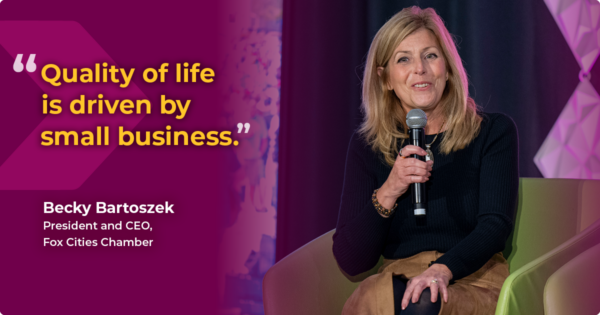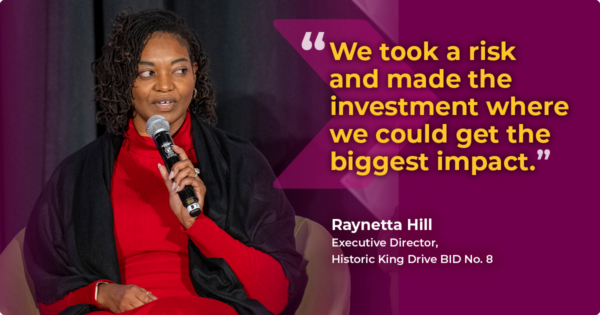
“Community Catalysts: How Chambers, Business Improvement Districts, and Visitors Bureaus Are Innovating Today,” a panel at the Wisconsin Economic Summit 2024, featured (from L to R) Becky Bartoszek, Jacqui Sharpe, Raynetta Hill, Chris Clemens, and WEDC Deputy Secretary Sam Rikkers as moderator.
New ideas to stimulate business growth and shake off old ways of doing things are being created in Wisconsin, with impressive results.
Tourism, chamber of commerce, and business improvement district representatives told attendees at the Wisconsin Economic Summit 2024 that finding new ways to attract and retain small businesses is a key to economic development.
Even for large corporations, quality of life is a major factor in workers’ decisions about where to accept a new job, and “Quality of life is driven by small business,” Becky Bartoszek, president and CEO of the Fox Cities Chamber of Commerce, said during the La Crosse event hosted by WEDC.
On that note, Bartoszek’s organization took bold action to encourage small businesses to thrive in the region they serve. The chamber launched a first-in-the-nation program called Connect Free, providing complimentary membership to small businesses with five or fewer employees, nonprofits with 10 or fewer employees, and all free-standing restaurants, with full access to the suite of support services the chamber offers, including partnerships with organizations like the local YMCA and Network Health.
“Wrapping our arms around small our small employers as a community and giving them resources at their most fragile time has helped many of these businesses grow,” Bartoszek said.
The chamber’s model has been adopted in places as far afield as Buffalo, New York, and Overland Park, Kansas. In fact, Bartoszek said 4% of chambers nationwide have followed the organization’s lead.
 In Milwaukee’s Historic King Drive Business Improvement District, a 4.5-mile commercial stretch, leaders focused on business retention and systematic improvement to make it an inviting and successful area.
In Milwaukee’s Historic King Drive Business Improvement District, a 4.5-mile commercial stretch, leaders focused on business retention and systematic improvement to make it an inviting and successful area.
“Our small business retention model was key,” said Raynetta Hill, the group’s executive director. “It makes no sense for us to attract, attract, attract, when folks that are already there can’t survive.”
Hill said the group built a supportive ecosystem where small businesses can go beyond surviving to thriving.
“We had grant opportunities. We had technical assistance opportunities. But we also wanted you to become bankable,” said Hill, adding that the group worked with businesses to establish succession plans and connect them to community development financial institutions.
Because of the geographic length the district spans, the group also targeted its efforts to the southern part, adding mural and statues to make it a more welcoming area.
“You’ll see lighted, bright benches and trash receptacles that are branded King Drive. You’ll see neighborhood banners, as well,” she said. “We took a risk and made the investment where we could get the biggest impact.”
 In Three Lakes, a northern Wisconsin destination, the community scrapped its traditional chamber of commerce model in favor of becoming the Three Lakes Area Visitors Bureau.
In Three Lakes, a northern Wisconsin destination, the community scrapped its traditional chamber of commerce model in favor of becoming the Three Lakes Area Visitors Bureau.
“We looked at the best way to support our partners and the best way to support our community,” said Jacqui Sharpe, executive director of the group. “For us, that has been to lean into the tourism side.”
Sharpe said that model allows it to be fully funded by room tax revenue instead of membership fees. “It allows us to spend our time working on destination development and continue to bring overnight guests into our community,” she added.
Chris Clemens, former executive director of the Viroqua Chamber of Commerce, said connecting with various business constituencies was crucial to his work. His chamber consists of a variety of businesses, from small shops to Organic Valley.
He advised chambers to tailor their services to match their communities’ business makeup.
“Because of the diversity of businesses, your size, and their needs, trying to develop a one-size-fits-all basket of services was really an impossibility,” Clemens said.
For example, Organic Valley didn’t direct assistance from the chamber but recognized the value of what it was doing for smaller businesses in the area. “They’re trying to attract here from all over the country and the world… Their response was, ‘Just keep the events coming.’”
